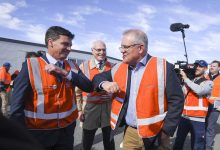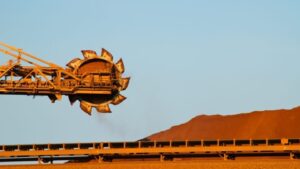The Morrison government will back the development of yet more gas basins and the construction of new gas pipelines, as part of a new infrastructure plan that sees Australia double down on its status as a leading global producer of fossil fuels.
The 2021 National Gas Infrastructure Plan released on Friday outlines the Morrison government’s vision to expand the gas industry over the next two decades, including more production and spending on new gas infrastructure to meet, what it hopes will be expanded domestic and international demand.
The plan suggests the Morrison government will look to open up at least one additional gas basin in Australia’s north – with options for more – and support the construction of new pipelines to link gas production in Queensland and the Northern Territory to gas users in the southern states.
It comes just weeks after the conclusion of the Glasgow COP26 climate talks, where Australia signed the final communique that asked countries to improve their short term emissions targets in 2022, and then promptly declared it wouldn’t.
The Australian positioning at Glasgow was largely about declaring that the country remained a great place to invest in fossil fuels.
“Gas supplies are likely to fall short of domestic and export demand by the end of the decade if further action to unlock supply and deliver key infrastructure is not taken by industry,” the report says.
“The development of new gas fields in existing and emerging basins will require new infrastructure to transport gas to market. Strategic expansions to existing pipeline capacity and the construction of entirely new pipeline routes, including from north to south, are needed to keep markets supplied.”
The federal government has already committed significant funding to support the Beetaloo, Galilee, Narrabri and Bowen gas basins already under development, but it now says more may be necessary.
The gas infrastructure plan identifies three “priority actions” to be pursued by the federal government, which it says are necessary to ensure Australia remains well supplied with gas and can continue selling gas into the Asian market.
The plan, if delivered, will mean more gas production more greenhouse gas emissions both in Australia and offshore.
“The Morrison government is serious about gas and acknowledges the important role it plays supporting jobs, food production, manufacturing, industry, exports and energy supply,” federal energy minister Angus Taylor said.
Climate advocacy group 350.org Australia slammed the infrastructure plan, saying it worked to benefit the fossil fuel industry and companies that were financially backing the Morrison government.
“New gas projects are damaging to the climate and local environment and fiercely opposed by Traditional Owners and local communities. The government throwing their support and our public money at these dirty gas projects will just strengthen community opposition,” 350.org Australia campaigner Shani Tager said.
“The Morrison Government has a track record of giving public money to gas industry players with close ties to the Liberal party, and there’s no reason to think that this new program will be any different – the whole thing stinks. ”
While the plan outlines the Morrison government’s support for building a hydrogen industry in Australia, the infrastructure plan is primarily focused on the production of hydrogen using fossil fuels and combined with carbon capture and storage technologies.
“The Government has a vision of developing a world-leading clean hydrogen industry and there is significant opportunity for growth in the future. Hydrogen can be produced in different ways, using a range of fuel sources,” the report says.
“In the future, abundant fuel sources for hydrogen production, including renewables, coal and natural gas, along with promising locations for CCS technology, make Australia well placed to benefit from the global hydrogen economy,” it adds.
The report underpins the government’s intentions to grow the extraction and use of fossil gas, further positioning it as the Morrison government’s preferred energy source, even as the rest of the world looks towards zero emissions sources.
The plan shows the government anticipating increased global demand for gas in the future, at a time when there is growing international momentum to shift away from fossil fuels, and defies global agreements to keep global warming to within safer levels.
Recently published projections of Australia’s greenhouse gas emissions and the Morrison government’s “plan” for achieving a zero net emissions target show that the Morrison government anticipates that Australia’s gas industry will grow.
The forecasts, and the Morrison government’s support for a larger gas industry, stand in contrast to the assessment published by the International Energy Agency that concluded that no new gas developments could be commenced in a scenario that was consistent with keeping global warming to within 2 degrees.
The latest gas infrastructure plan makes little acknowledgment of the need to phase out fossil fuels or tackle climate change, only mentioning global decarbonisation efforts as a positive opportunity for gas to act as a transition fuel.
Taylor said on Friday that the government would again consult with the gas industry to identify which prospective developments – through an ‘expressions of interest’ process – may be selected for government support.
“The government wants industry to make these investments, and the investment framework and EOI will allow us to take action to accelerate the development of critical projects to final investment decision,” Taylor said.
The Australian Conservation Foundation’s climate change campaigner, Suzanne Harter, said the gas plan contradicted commitments the Morrison government signed in Glasgow.
“It is completely out of sync with global market trends which are to get out of fossil fuels,” Harter said.
“Gas is a dangerous fossil fuel that plays a big part in driving global heating.”
“Any plan to expand the gas industry risks Australia’s future by committing us to more extreme weather events, longer droughts and more black summers,” Harter added.
See also: Fossil gas pared back to its bare bones in South Australia’s renewables grid









